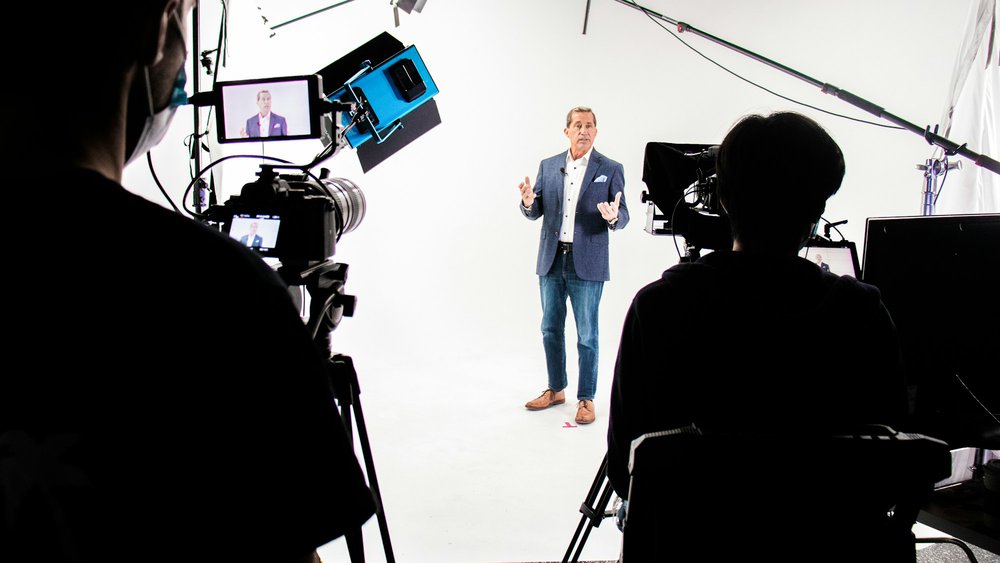Social proof is one of the most powerful forces in marketing. It explains why we check reviews before hitting “buy” and why recommendations carry so much weight in our decisions. Social proof is a psychological phenomenon where people look to others' actions to guide their own behavior, especially in uncertain situations.
For businesses, testimonials and case studies are the clearest way to put social proof into practice. People trust people more than brands, making social proof a critical factor in consumer decision-making. Instead of simply telling people what your brand does, they let potential customers see real clients getting real results through professional video production.
That kind of credibility builds trust, lowers hesitation, and helps improve conversion rates. Social proof can influence consumer behavior in both positive and negative ways, promoting beneficial actions but also sometimes leading to undesirable conformity or problematic herd behavior. Video production services such as testimonial videos and video case studies have become essential tools for showing value and winning over decision-makers.
In this article, we’ll unpack why social proof matters, how testimonials and case studies work, and the smartest ways to use them to strengthen your brand and drive growth.
What is Social Proof?

Social proof is simple: people trust people. When we see others using a product or service, we naturally assume it has value. This psychological phenomenon drives everything from customer reviews to viral trends. Social psychology explains how social contexts shape individual actions and perceptions, showing how social proof influences group behavior.
In marketing, social proof acts as a trust signal that helps potential customers make faster, more confident decisions. It works through informational influence, where people look to others to determine the correct way to behave, especially in uncertain situations. Instead of relying solely on brand claims, they trust satisfied customers.
Key facts include:
- 92% of consumers trust online reviews as much as personal recommendations (BrightLocal, 2024).
- 93% of marketers say video marketing delivers positive ROI (Wyzowl).
- Social proof’s influence varies across collectivist and individualist cultures.
- 84% of B2B buyers start their buying process with a referral.
- Peer recommendations influence over 90% of B2B buying decisions.
While social proof builds trust and drives decisions, it can also lead to herd mentality, where individuals follow the group even if it leads to poor choices.
The Value of Social Proof in Marketing

Social is a core part of how people make decisions. For businesses, it can quickly build brand credibility and reduce the hesitation buyers feel before making a commitment. Leveraging social proof through testimonials, reviews, and endorsements is a proven way to influence consumer behavior and improve marketing outcomes.
Here’s how social proof helps you, and why leveraging social proof is a key tactic for conversion rate optimization:
Enhancing brand reputation
Testimonials and case studies offer real proof that your business delivers. When prospects see positive results from satisfied customers, your brand instantly feels more credible and trustworthy. Endorsements or testimonials from industry authorities and thought leaders can further enhance your brand’s reputation and credibility.
Building brand trust
People put more weight on peer feedback than on a company's own message. Video testimonials serve as a third-party endorsement, giving you credibility that cannot be manufactured.
Reducing purchasing uncertainty
Social proof addresses the questions running through your buyer’s mind: Will this actually work for me? Can I trust them? By providing real-world evidence of your product’s effectiveness, social proof helps buyers make more informed decisions. Case study videos answer these by showing real results, not just promises.
Driving conversions and sales

When potential customers see measurable results, they are far more likely to act. Social proof is a powerful tool to convince people to take action, reducing hesitation and increasing conversions. Adding testimonial or case study videos into your video campaign strategy can directly improve conversion rates and speed up the sales cycle.
Benefits of Using Video Testimonials and Case Studies
Case studies and testimonials are two of the strongest forms of social proof. They show real outcomes through the voices of satisfied customers. Including data points, such as the number of customers you've served, can further build trust and credibility.
Video takes this further. Seeing clients on screen builds instant credibility and connection in a way written words can’t. That’s why testimonial videos remain one of the most trusted formats in corporate video production.
For B2B buyers, video case studies go deeper. They outline the challenge, the solution, and measurable results, helping decision-makers picture the same value for their own business.
The result: stronger trust, more confident buying decisions, and higher conversion rates.
The Power of Testimonials
One of the clearest forms of social proof is the customer testimonial. Hearing directly from someone who has already used your product or service makes your brand more relatable and believable. Testimonials from previous customers and brand advocates are especially persuasive because they come from real users who can share authentic experiences and results.
Video testimonials take that to another level. Instead of reading a line of text, prospects see and hear a real person talk about the difference your company made. It’s a lot like a friend pulling you aside to say, “This worked for me — you should try it.” That kind of human connection makes your message stick and makes it more persuasive.
Harnessing the Voice of Satisfied Customers

Testimonials are short but powerful endorsements. They are simple for customers to give and easy for your audience to understand. When captured as testimonial videos, they turn into valuable assets you can place on your website, share in sales presentations, or post on social platforms.
Unlike written quotes, video adds tone, body language, and authenticity. Prospects can see the confidence in your client's voice, which makes the endorsement feel genuine and trustworthy.
Building Trust and Relatability
Trust sits at the center of every buying decision. When potential customers see peers or industry leaders sharing their experiences, they are more likely to picture themselves achieving similar results. Testimonials and case studies help prospective buyers picture themselves in the story and build trust faster than a traditional sales pitch.
That is why B2B video production often focuses testimonial videos on relatable stories. It could be someone in the same role as your prospect, a recognizable company in their industry, or a peer who faced similar challenges. These stories reduce skepticism and help buyers move forward with more confidence.
A great example of this in action is our collaboration with BrainRobotics, where we transformed a complex innovation into a relatable, human story through 3D animation. See how we turned advanced prosthetic technology into an inspiring narrative that builds trust and emotional connection. Read the case study.
The Advantage of Case Studies
Case studies do more than skim the surface. They’re the business world’s version of before-and-after photos, only instead of showing a kitchen remodel, they show how a company solved a real problem. A well-crafted case study is a quintessential example of the power of social proof: it offers a narrative of a real client, explains the specific challenge, details how the vendor stepped in, and backs everything up with tangible metrics. They walk prospects through the full story, the challenge, the solution, and the measurable results your company delivered.
Real-World Example: At Levitate, we’ve helped brands bring their success stories to life through video case studies. For instance, our partnership with Qventus highlighted how their AI-driven solutions improved hospital efficiency. We also worked with Aries Clean Technologies to showcase the impact of their sustainable energy systems. These projects demonstrate how case study videos not only tell a story but also prove measurable results.
Providing Detailed and Data-Driven Stories
Unlike testimonials, which are quick endorsements, case studies give depth. They show how your product or service solved a problem, backed by hard statistics and customer outcomes.
Video makes that story easier to connect with. Instead of scrolling through a PDF, prospects can watch the customer explain the challenge and results in their own words, supported by stats, visuals, and context.
Engaging Senior-Level Executives and Decision-Makers
Executives don’t want promises. They want proof. Case study videos deliver it by highlighting business impact such as revenue growth, cost savings, or improved efficiency. Case study videos are especially effective at convincing potential clients of your expertise and credibility.
That is why corporate video production often includes case studies in the middle and bottom of the funnel. They give stakeholders the confidence to move forward, backed by real-world outcomes that speak their language.
Demand Gen Report found that are consistently one of the top three content formats B2B buyers rely on when evaluating vendors. Video case studies make that trust even stronger by showing measurable ROI. Learn how case study videos can build credibility for your brand.
Creating Effective Video Testimonials and Case Studies

Strong testimonials and case studies don’t just appear on their own. They’re built with tactics and storytelling in mind. The right customer, the right story, and the right production quality make all the difference. User-generated content, such as customer videos and reviews, is one of the strongest forms of social proof because it comes from real people, not brands.
Incentivizing customers to leave reviews or create user-generated content can be an effective tactic for building social proof.
Start with the right clients
Choose satisfied customers who can clearly explain the benefits of your product or service. Selecting clients who closely match your target audience ensures your testimonials and case studies will resonate more effectively. A thoughtful interview helps uncover authentic insights that connect with your audience. Consider creating a list of questions to ask your customers. This will help them articulate the specific satisfaction of your product or service.
Leverage professional video production
Working with a partner like Levitate Media ensures your testimonial and case study videos look polished, feel authentic, and align with your brand. From scriptwriting to editing, every detail plays a role in building credibility.
Highlight what matters most
Tailor each video to your audience. For B2B companies, focus on ROI, efficiency gains, or problem-solving outcomes. For broader audiences, highlight relatability and ease of use. For some audiences, highlighting your company’s commitment to social responsibility can be a powerful form of social proof.
Use variety for impact
A mix of testimonial videos and case study videos from different industries, company sizes, or roles shows the wide value of your solution, and helps prospects picture themselves in the story. It's important to note that the power of social proof can vary across cultures: collectivist cultures, which prioritize group consensus and social responsibility, tend to conform more to social proof norms, while individualist cultures, which value personal choice, may respond differently.
How to Use Video Testimonials and Case Studies in Marketing
Capturing strong testimonial and case study videos is just the beginning. To get real results, they need to be part of your larger video marketing strategy. Review sites and social media platforms are also powerful channels for sharing social proof, helping to build trust and influence potential customers.
Here are some of the most effective ways:
- Embed video testimonials on your homepage and product pages.
- Share case study videos in your email marketing campaigns.
- Post video testimonials on review sites like Yelp, Amazon, and Trustpilot to reach audiences actively seeking feedback.
- Share social media posts from satisfied customers, influencers, or industry experts on platforms like Instagram, Facebook, or Twitter to amplify positive feedback and increase brand visibility.
- Use snippets of video testimonials in paid ads to boost credibility.
Tip: Highlighting social proof, such as testimonials or positive reviews, in your registration or sign-up flow can increase form submissions.
Website and landing pages
Placing testimonial videos on your service or product pages builds trust right away. Displaying star ratings on product pages provides an at-a-glance trust signal for potential buyers. Case study videos are especially effective on landing pages, where conversions happen.
Sales enablement
Give your sales team short case study clips to use in presentations and follow-ups. These proof points reduce objections and help deals move forward faster.
LinkedIn and B2B platforms

Sharing testimonial videos on LinkedIn puts your message in front of decision-makers who are already looking for thought leadership and trusted partners. Sharing influencer content on LinkedIn can further enhance your brand’s credibility and reach, as influencer-created posts and collaborations help validate your brand in the eyes of a wider professional audience. Think of it as putting your happiest customer in the room with your prospect, only on a platform where thousands of others can see it too.
Email campaigns and nurture sequences
Adding testimonial or case study clips to email outreach keeps prospects engaged and builds trust as they move through the funnel. Including influencer posts in your email campaigns can also provide additional social proof and increase engagement.
Events and webinars
Video case studies work well in virtual or live events. They add peer validation to your brand story and resonate with executives who want proof of impact.
When you use testimonial and case study videos across these channels, you are not just sharing happy clients, you are positioning your brand as a credible, trusted choice in your industry.
The Final Word
Social proof is no longer optional. In the digital age, social proof is more influential than ever, especially among younger generations who rely on it to guide their decisions. It is one of the most effective ways to build trust, lower risk, and drive conversions. Testimonials and case studies give potential customers the confidence to choose your brand by showing them real results from satisfied clients. Decision-makers rely on them to validate their choices. They provide credibility and proof that simple claims cannot match.
At Levitate Media, we help businesses bring these stories to life with professional video production services. From planning and scripting to filming and editing, our team produces testimonial and case study videos that inspire trust and deliver measurable ROI.
Ready to put the power of social proof to work for your business? Contact us today to start creating testimonial and case study videos that build credibility and accelerate growth.
FAQs About Social Proof, Testimonials, and Case Studies
Why are testimonials such a powerful type of social proof?
Testimonials work like word-of-mouth on camera. They show potential customers that real people have had positive experiences with your brand. Testimonial videos are especially effective because they capture emotion, tone, and authenticity.
How do case studies help in B2B marketing?
Case studies provide detailed, data-driven stories about how your product or service solved a real problem. Video case studies make these stories more engaging, helping executives see measurable ROI and reducing hesitation in the buying process.
What's the difference between testimonials and case studies?
Testimonials are short endorsements from satisfied customers. Case studies go deeper by showing the challenge, the solution, and the results. Both can be produced as corporate video content to strengthen trust and credibility.
How can businesses use social proof to increase conversion rates?
Placing testimonial and case study videos on websites, landing pages, or in sales presentations builds credibility where it matters most. When potential customers see proof of results, they are more likely to convert.
Where should testimonial and case study videos be shared?
Businesses get the best results when they share these videos across multiple platforms, their website, LinkedIn, email campaigns, webinars, and even sales decks. For ideas, see our guide on video marketing strategy.
Effective social proof can make a significant difference in the success of your business. Levitate Media can help you achieve that success with high-quality, professional testimonial videos and case studies.









